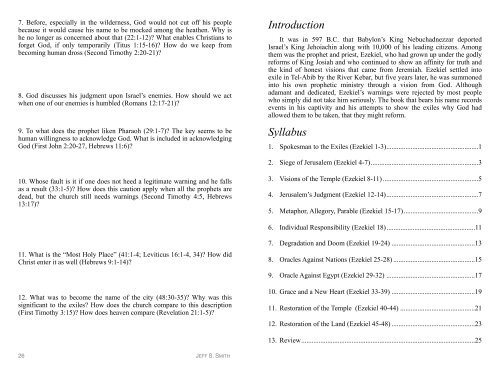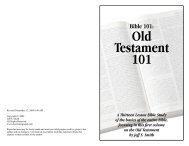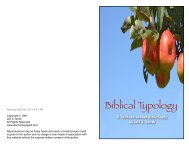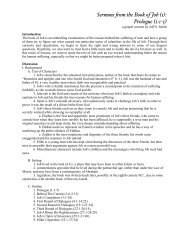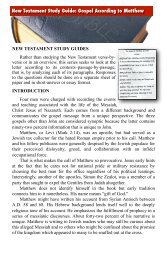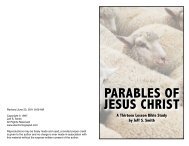GREAT THEMES OF EZEKIEL - ElectronicGospel
GREAT THEMES OF EZEKIEL - ElectronicGospel
GREAT THEMES OF EZEKIEL - ElectronicGospel
You also want an ePaper? Increase the reach of your titles
YUMPU automatically turns print PDFs into web optimized ePapers that Google loves.
7. Before, especially in the wilderness, God would not cut off his peoplebecause it would cause his name to be mocked among the heathen. Why ishe no longer as concerned about that (22:1-12)? What enables Christians toforget God, if only temporarily (Titus 1:15-16)? How do we keep frombecoming human dross (Second Timothy 2:20-21)?Judgment can wait no longer because Judah has fallen so far in forgettingGod altogether. Dross is rubbish and it is burned up or disposed of until itceases to be. Unless we would be cast away, we must overcome ourdishonors.8. God discusses his judgment upon Israel’s enemies. How should we actwhen one of our enemies is humbled (Romans 12:17-21)?We should not mock them, even if we are pleased that they have beenhumbled. We should offer them assistance in the hope they will change.9. To what does the prophet liken Pharaoh (29:1-7)? The key seems to behuman willingness to acknowledge God. What is included in acknowledgingGod (First John 2:20-27, Hebrews 11:6)?Ezekiel likens him to a crocodile or dragon swimming around in the Nile,which he considered to be his river and creation. One must believe, trust,obey and submit to him.10. Whose fault is it if one does not heed a legitimate warning and he fallsas a result (33:1-5)? How does this caution apply when all the prophets aredead, but the church still needs warnings (Second Timothy 4:5, Hebrews13:17)?Anyone who refuses to heed a legitimate warning is solely responsible forthe troubles that result, but if the watchman fails to sound a warning, thenhe is also to blame. Today, we can utilize the New Testament prophecies asimportant warnings and listen to our bishops and preachers who repeatthose warnings and apply them to present conditions.11. What is the “Most Holy Place” (41:1-4; Leviticus 16:1-4, 34)? How didChrist enter it as well (Hebrews 9:1-14)?The Most Holy Place was the inner and most sacred room of the temple, intowhich only the High Priest entered once a year on the Day of Atonement.Christ entered once for all by his own death.12. What was to become the name of the city (48:30-35)? Why was thissignificant to the exiles? How does the church compare to this description(First Timothy 3:15)? How does heaven compare (Revelation 21:1-5)?The name was to become “THE LORD IS THERE.” It had been a long timesince the exiles had enjoyed the presence of God in this way. The church isthe household of God while heaven is his throne where he will have directfellowship with the redeemed.IntroductionIt was in 597 B.C. that Babylon’s King Nebuchadnezzar deportedIsrael’s King Jehoiachin along with 10,000 of his leading citizens. Amongthem was the prophet and priest, Ezekiel, who had grown up under the godlyreforms of King Josiah and who continued to show an affinity for truth andthe kind of honest visions that came from Jeremiah. Ezekiel settled intoexile in Tel-Abib by the River Kebar, but five years later, he was summonedinto his own prophetic ministry through a vision from God. Althoughadamant and dedicated, Ezekiel’s warnings were rejected by most peoplewho simply did not take him seriously. The book that bears his name recordsevents in his captivity and his attempts to show the exiles why God hadallowed them to be taken, that they might reform.Syllabus1. Spokesman to the Exiles (Ezekiel 1-3) ..................................................... 12. Siege of Jerusalem (Ezekiel 4-7 )..............................................................33. Visions of the Temple (Ezekiel 8-11 ) ....................................................... 54. Jerusalem’s Judgment (Ezekiel 12-14 ).....................................................75. Metaphor, Allegory, Parable (Ezekiel 15-17 )...........................................96. Individual Responsibility (Ezekiel 18 )...................................................117. Degradation and Doom (Ezekiel 19-24 ) ................................................ 138. Oracles Against Nations (Ezekiel 25-28 ) ............................................... 159. Oracle Against Egypt (Ezekiel 29-32 ) ................................................... 1710. Grace and a New Heart (Ezekiel 33-39 ) ................................................ 1911. Restoration of the Temple (Ezekiel 40-44 ) ........................................... 2112. Restoration of the Land (Ezekiel 45-48 ) ................................................ 2313. Review .................................................................................................... 2526! JEFF S. SMITH


